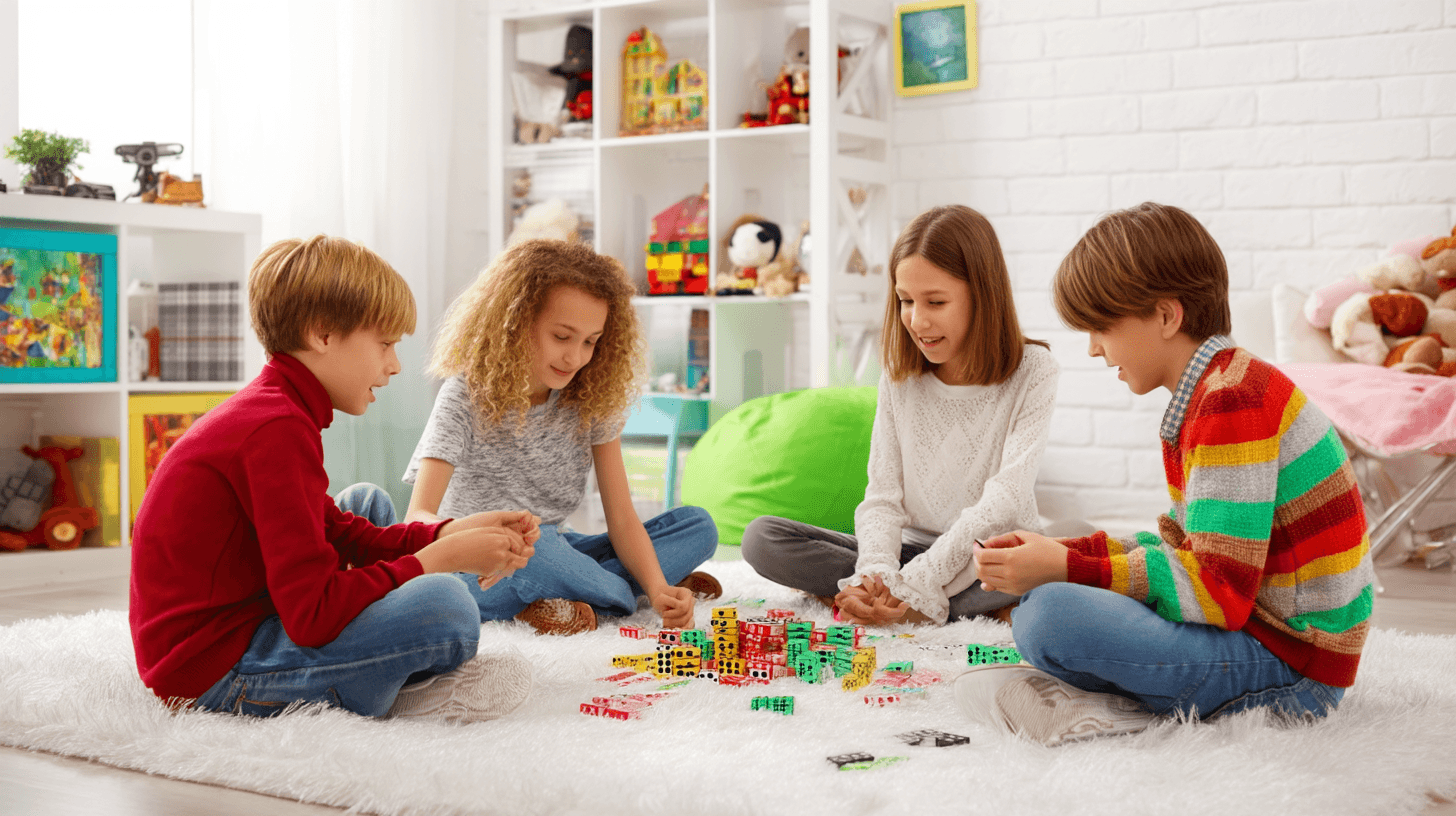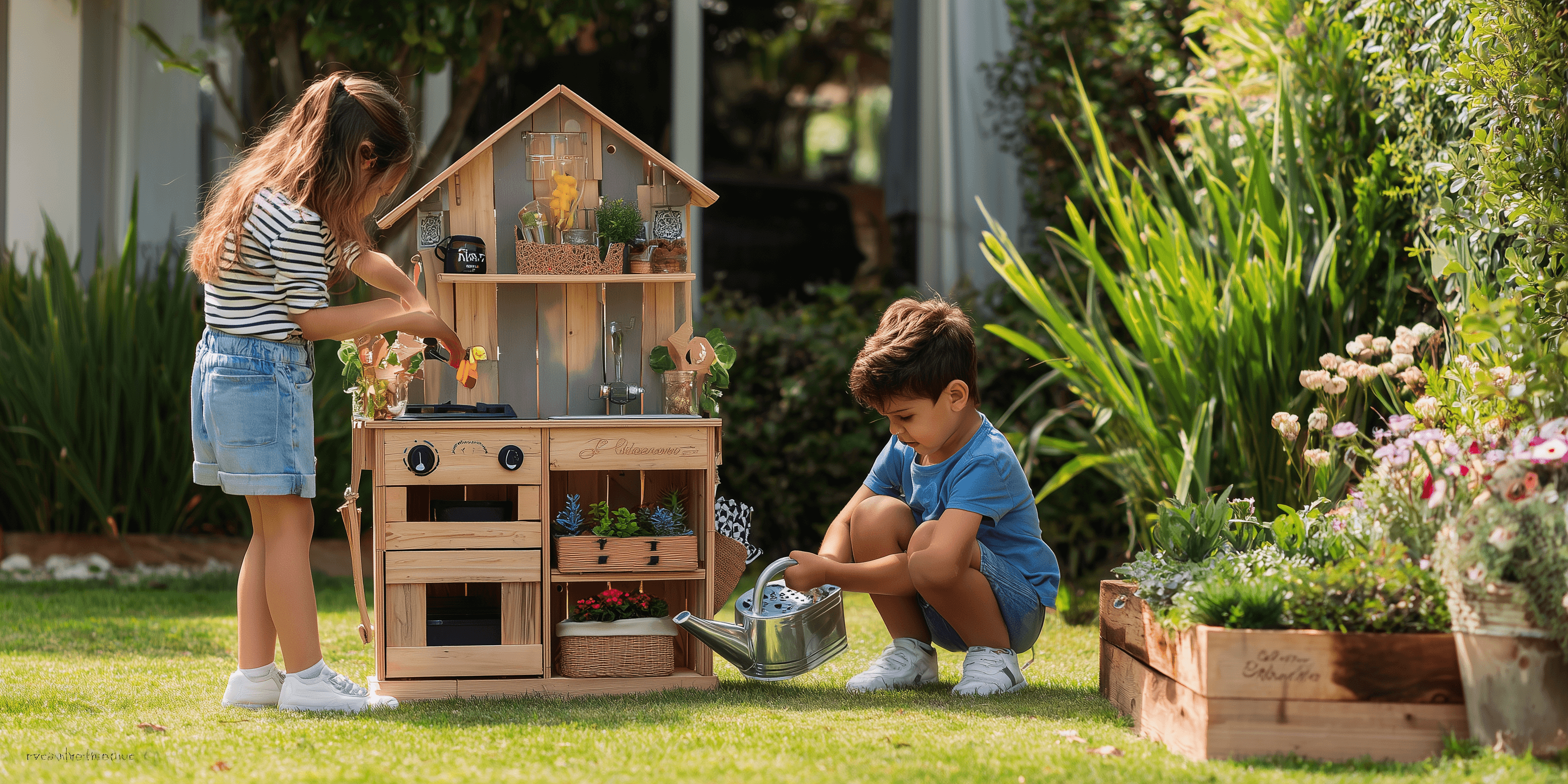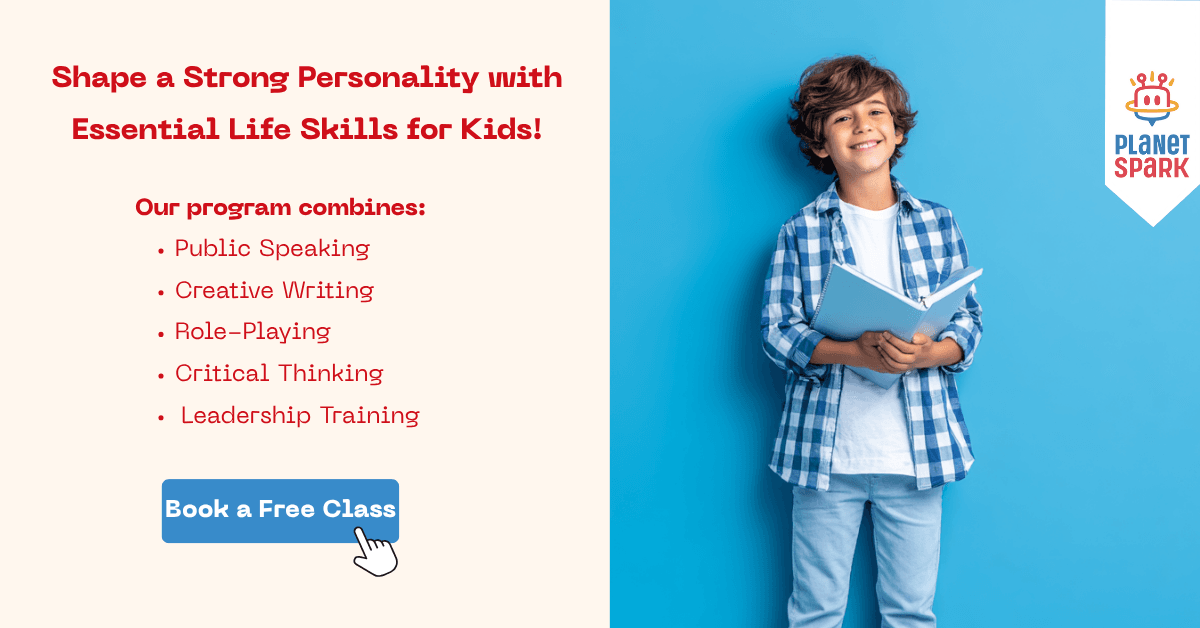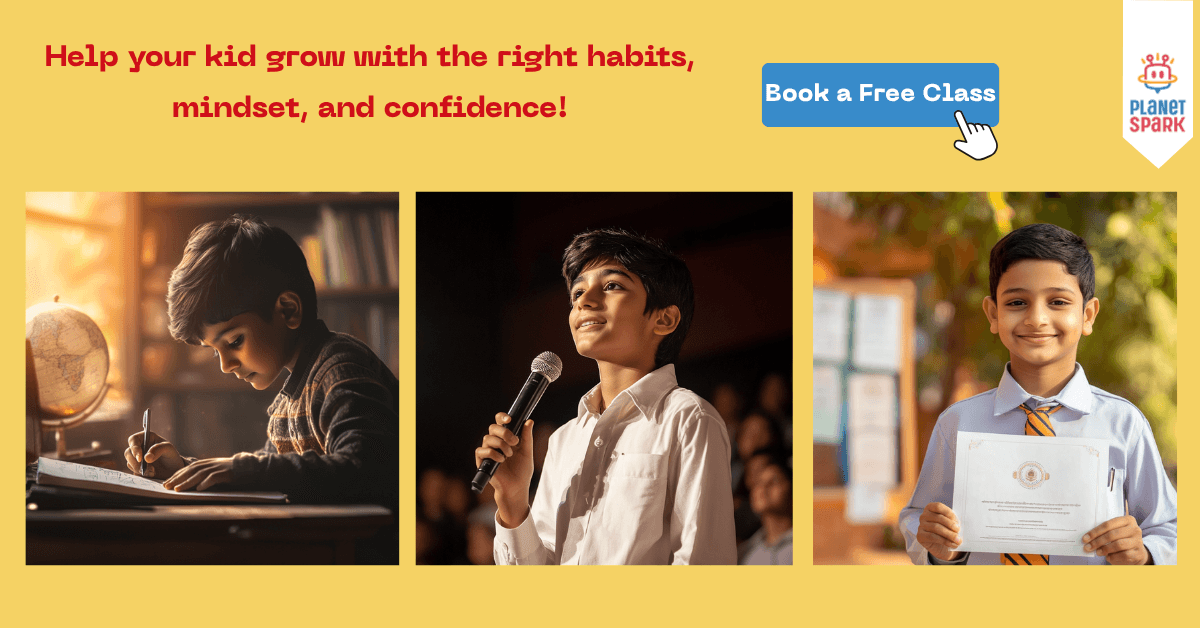Self-Improvement: A Guide for Kids to Build Personality
Last Updated At: 31 Jul 2025
12 min read

Table of Contents
- What Is Self-Improvement for Kids?
- Top 10 Self-Improvement Tips for Kids
- Why Is Self-Improvement Important for Children?
- Best Self-Improvement Books for Kids
- Fun Self-Improvement Activities for Kids
- How Parents Can Support Their Child’s Self-Improvement Journ
- Building a Daily Self-Improvement Routine for Kids
- Conclusion
- Frequently Asked Questions
In today’s competitive world, kids need more than just academic knowledge they need emotional intelligence, communication skills, and self-awareness. That's where self-improvement comes into play for kids.
This blog will explore practical self-improvement tips, books, and engaging activities that help children become the best version of themselves. Along the way, we’ll also show how PlanetSpark’s Personality Development Course equips kids with vital life skills like public speaking, confidence building, and creative thinking laying the foundation for a successful future.
What Is Self-Improvement for Kids?
Self-improvement for kids refers to the conscious process of enhancing one’s personality, behavior, mindset, habits, and communication abilities. It is about encouraging children to develop emotional intelligence, self-discipline, kindness, goal-setting skills, and resilience. These qualities shape a child's character and prepare them to take on future challenges with confidence.
When started early, self-improvement becomes a habit that sticks for life.
Top 10 Self-Improvement Tips for Kids
Here are ten simple yet effective self-improvement tips for children that parents and teachers can start implementing today:
1. Encourage Positive Self-Talk
Children often internalize limiting beliefs such as "I'm not good at this" or "I'll never get it right." Teaching them to shift their internal dialogue helps build resilience and confidence.
How to implement:
Use affirmations like “I can improve with practice.”
Celebrate attempts as much as achievements.
Encourage journaling with prompts like “Something I did well today…”
2. Practice Daily Gratitude
Gratitude cultivates a positive mindset and improves emotional regulation. Kids who learn to recognize the good around them become more content and less anxious.
How to implement:
Start a “Gratitude Jar” where they write and drop one note daily.
Ask “What made you smile today?” before bed.
Encourage drawing what they are thankful for.
3. Set Small Achievable Goals
Goal setting introduces kids to the idea of progress over perfection. It also helps in building time management and discipline.
How to implement:
Help them set SMART goals (Specific, Measurable, Achievable, Relevant, Time-bound).
Create goal charts or visual trackers.
Reflect weekly: “What did I try this week? What can I try next?”
4. Promote Healthy Routines

Good habits for kids are a pillar of self-improvement. Kids thrive with structure they feel secure and perform better in academics and social settings.
How to implement:
Build a daily schedule that includes study, play, food, and rest.
Ensure at least 8-10 hours of sleep for younger kids.
Create bedtime rituals like reading or stretching.
Small Habits. Big Transformation.
From shy whispers to bold speeches watch your child grow in every session.
Book a free demo class for PlanetSpark’s personality development programme!
5. Involve Them in Decision-Making
Giving children autonomy builds their ability to think independently and weigh consequences.
How to implement:
Let them choose their weekend activity or meal from two options.
Involve them in setting family rules or planning routines.
Ask open-ended questions: “What would you do in this situation?”
6. Limit Screen Time, Encourage Real Play

Screens can overstimulate the brain, disrupt sleep, and reduce attention span. Offline play fuels imagination, empathy, and social intelligence.
How to implement:
Introduce activities like LEGO building, drawing, gardening, or pretend play.
Organize screen-free family nights with games or storytelling.
Model mindful digital use.
7. Teach Problem-Solving Techniques
Children face daily challenges from schoolwork to friendships. Teaching them how to analyze and address these builds confidence and resourcefulness.
How to implement:
Use the 3-step method: Identify the problem → Think of 2–3 solutions → Try one.
Use art of storytelling: “What could the character have done differently?”
Play strategy games like chess, riddles, or puzzles.
8. Model the Behavior You Want to See
Children are keen observers. How adults behave in front of them matters more than what we instruct them to do.
How to implement:
Demonstrate respect, even when you disagree.
Share your challenges openly: “I was nervous for my meeting, but I practiced.”
Practice apology and forgiveness.
9. Celebrate Effort, Not Just Results
Overemphasis on grades or performance can cause fear of failure. Instead, celebrate grit, persistence, and learning from mistakes.
How to implement:
Say: “You worked so hard on that project!” instead of “You’re so smart!”
Use “effort charts” or visual trackers of hard work.
Encourage retrying and learning from failure.
10. Enroll Them in Personality Development Programs
While home and school offer foundational learning, a structured personality development course for kids can accelerate a child’s holistic growth.
How to implement:
Choose programs focused on communication, leadership, creativity, and emotional intelligence.
Look for interactive, feedback-driven modules.
Why Is Self-Improvement Important for Children?
Here are key reasons why self-improvement should be a part of every child’s early education:
Boosts self-esteem and confidence
Enhances communication and social skills
Encourages emotional regulation and self-awareness
Develops leadership and decision-making skills
Improves focus and goal-setting abilities
Prepares kids to face failures and bounce back stronger
Self-improvement builds a child’s inner world just as education builds their academic world.
Books Teach. PlanetSpark Transforms!
Enroute your child to the most engaging self-improvement journey.
Book a free demo class now
Best Self-Improvement Books for Kids

Books are a fantastic way to teach children about self-development through stories, characters, and lessons. Here are some age-appropriate recommendations:
For Ages 6–8:
What Do You Do With a Problem? by Kobi Yamada
Have You Filled a Bucket Today? by Carol McCloud
The Energy Bus for Kids by Jon Gordon
For Ages 9–12:
The 7 Habits of Happy Kids by Sean Covey
I Am Enough by Grace Byers
You Are a Champion by Marcus Rashford
For Ages 12+:
Mindset: The New Psychology of Success (Young Readers Edition) by Carol S. Dweck
How to Win Friends and Influence People for Teen Girls by Donna Dale Carnegie
Books can be a mirror and a window reflecting inner thoughts while showing new perspectives.
Try 10 Must-Read Moral Stories for Kids packed with life lessons.
Fun Self-Improvement Activities for Kids
Self-growth doesn't have to be serious, it can be fun too! Try these activities at home or in the classroom:
1. Role-Playing Games

Why it helps:
Role-playing builds confidence, empathy, and communication skills. It allows kids to safely explore real-world scenarios, practice problem-solving, and overcome social anxiety.
How to:
Set up themed scenarios like:
Ordering food at a restaurant
Introducing themselves to a new friend
Negotiating a group activity
Pretending to be a teacher or news anchor
Use costumes or props to make it more engaging.
Ask reflection questions like, “How did you feel while doing that?” or “What would you do differently next time?”
There are some more in the list, check for Fun English Learning Games to Help Your Child Get Started.
2. Mindfulness and Breathing Exercises
Why it helps:
These exercises improve focus, emotional control, and stress management especially helpful during exams, social pressures, or daily transitions.
How to:
Try a 2-minute guided breathing session: Inhale for 4 counts, hold for 4, exhale for 4.
Play calming music or nature sounds during “mindful minutes.”
Introduce “mindful walks” where kids observe and describe what they see, hear, or feel.
3. Journaling

Why it helps:
Journaling fosters self-reflection, emotional intelligence, and written expression. It’s a great way for kids to organize thoughts and recognize their own growth.
How to:
Provide prompts like:
“Something new I tried today…”
“Three things that made me smile…”
“One thing I want to get better at…”
Allow free drawing for younger kids who aren’t confident with writing yet.
Use colorful journals or apps for digital journaling.
Help Your Child Grow Into a Leader, Not Just a Learner!
PlanetSpark prepares kids for school, stage, and life.
Experience the transformation with a free trial session today!
4. Puzzle Challenges and Brain Teasers
Why it helps:
Engaging with puzzles boosts logic, patience, and critical thinking. Kids learn the value of persistence and out-of-the-box thinking.
How to:
Introduce age-appropriate puzzles:
Jigsaw puzzles
Sudoku or crossword puzzles
Maze-solving worksheets
Time them for fun challenges and encourage them to beat their own scores.
5. Public Speaking Practice

Why it helps:
Speaking in front of others develops confidence, clarity of thought, and stage presence. It teaches kids how to organize ideas and express them persuasively.
How to:
Begin with daily “dinner table speeches” 1-minute talks on any topic like their favorite toy or book.
Record them for playback and self-review.
Let them host family quiz nights or mini shows.
Here are some 13 Best Practises For Impactful Public Speaking to add in your kid's daily routine.
6. Creative Expression
Why it helps:
Creativity enhances emotional development, self-confidence, and original thinking. Artistic activities allow children to explore identity and develop their voice.
How to:
Offer various mediums: painting, clay modeling, music, dance, or comic strip creation.
Let them design a book cover or write their own ending to a story.
Encourage “expression corners” at home or school with drawing boards or musical instruments.
How PlanetSpark Supports Self-Improvement in Kids
PlanetSpark offers a comprehensive Personality Development Course designed to elevate every child's communication, confidence, and creativity.
Key Features of the Program:
Public Speaking Training: Kids overcome stage fear and speak confidently in front of any audience.
Leadership & Social Skills: Activities designed to improve collaboration, empathy, and leadership traits.
Debate, Storytelling & Creative Writing Modules: Helps students think critically and express ideas with clarity.
Goal Setting & Time Management Sessions: Students learn how to stay focused, manage their time, and achieve personal goals.
Personal Growth Tracker: Weekly feedback and performance insights that map each child’s personality journey.
Expert Mentorship + AI-Backed Progress Reports: Kids get real-time feedback, personalized learning, and expert coaching.
PlanetSpark helps kids transform from shy to shining, giving them the edge in both school and life.
How Parents Can Support Their Child’s Self-Improvement Journey
Parents play a pivotal role in a child’s growth. Here are a few practical ways to support your child’s self-improvement:
Spend quality time listening without judgment.
Give constructive feedback, not criticism.
Introduce age-appropriate challenges.
Celebrate milestones—big or small.
Be patient. Growth is a marathon, not a sprint.
Encourage them to take ownership of their learning.
Remember: the goal is not perfection but progress and positivity.
Building a Daily Self-Improvement Routine for Kids
Here’s an example of a daily routine that balances learning, play, and reflection:
| Time | Activity |
|---|---|
| 7:00 AM | Wake up, stretch, and express 3 gratitudes |
| 8:00 AM | School time or study |
| 4:00 PM | Outdoor play or creative hobby |
| 5:00 PM | Self-improvement activity (book, journaling, PlanetSpark class) |
| 7:00 PM | Family discussion / dinner-time storytelling |
| 8:00 PM | 5-minute reflection or meditation |
| 8:30 PM | Bedtime story and lights out |
Such routines create a growth mindset lifestyle—consistent, balanced, and motivating.

Conclusion
Helping children embark on a path of self-improvement is one of the most powerful gifts we can give them. By developing their character, communication, and confidence early, we set them up for lifelong success—not just academically, but emotionally and socially as well.
And while books and activities lay the groundwork, programs like PlanetSpark’s Personality Development Course help accelerate and structure this journey, turning kids into well-rounded, future-ready individuals.
Frequently Asked Questions
Q. What is self-improvement for kids, and why is it important?
Self-improvement for kids refers to the process of helping children grow emotionally, mentally, socially, and intellectually through intentional activities, routines, and mindset development. It’s not about pushing them toward perfection, but about cultivating self-awareness, confidence, responsibility, kindness, and the ability to communicate effectively.
Self-improvement is essential in the formative years because that’s when habits and attitudes are being built. Kids who practice self-improvement are more likely to become confident, resilient, and emotionally intelligent adults. They learn how to handle failure, make decisions, and set goals—skills that are critical in both academic and real-world settings.
Q. How can I teach self-improvement habits to my child at home?
Teaching self-improvement habits at home starts with small, consistent efforts. You don’t need complex routines—just meaningful interactions and supportive guidance. Here are a few ways to start:
Model good habits: Children mimic behavior. Be mindful of your actions and attitudes.
Introduce goal-setting: Help your child set a simple daily or weekly goal and track progress.
Encourage journaling: Writing thoughts, feelings, and reflections fosters emotional intelligence.
Use positive reinforcement: Praise effort, resilience, and honesty over mere achievements.
Have growth-mindset conversations: Shift focus from “I failed” to “What did I learn?”
Read self-improvement books together: Stories are a powerful way to introduce life lessons.
Q. Which books are best for teaching self-improvement to kids?
A. There are many inspiring books tailored for children that introduce themes like confidence, resilience, gratitude, and self-belief. Here’s a detailed list:
What Do You Do With a Problem? by Kobi Yamada – Teaches kids to face challenges.
Have You Filled a Bucket Today? by Carol McCloud – Promotes kindness and empathy.
I Can Handle It! by Laurie Wright – Helps kids develop emotional resilience.
The 7 Habits of Happy Kids by Sean Covey – Introduces leadership and life habits.
Mindset (Young Readers Edition) by Carol Dweck – Focuses on the power of attitude.
How to Win Friends and Influence People for Teen Girls by Donna Dale Carnegie – Great for improving social confidence.
Q. What are the most effective activities to help kids improve their personality?
A. There are several fun and impactful activities you can introduce at home or school that support personality development and self-growth. Here are some of the most effective ones:
Role-play: Create pretend situations like job interviews, storytelling, or debate scenarios.
Vision boards: Let your child paste pictures of their goals, dreams, or heroes. It helps with clarity and motivation.
Public speaking games: Challenge your child to talk about their favorite toy, movie, or place for one minute.
Gratitude journaling: A simple list of things they’re thankful for encourages positivity.
Mindfulness exercises: Use short breathing routines to teach calmness and focus.
Problem-solving challenges: Give them puzzles or daily dilemmas to think through independently.
Personalized Communication Report
Record a video to get a AI generated personalized communication report for your child
Select Learner's Class

Hi There, want to try these
tips for your child with
LIVE with our expert coach?
Let's check your child's
English fluency

